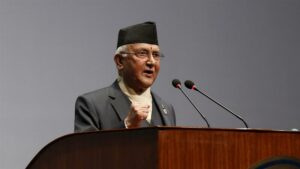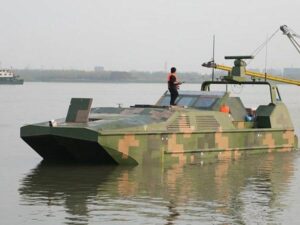 Israeli Prime Minister Benjamin Netanyahu has announced that he would name a new community in the Golan Heights after US President Donald Trump, who officially recognised the disputed area as Israeli territory. Israel has also stated that in appreciation of the U.S. president, it intends to name a proposed train station near Jerusalem’s Western Wall after him. Israeli Prime Minister Benjamin Netanyahu has announced that he would name a new community in the Golan Heights after US President Donald Trump, who officially recognised the disputed area as Israeli territory. Israel has also stated that in appreciation of the U.S. president, it intends to name a proposed train station near Jerusalem’s Western Wall after him. |
| Source: Reuters |
 Russia has successfully tested the world’s first floating nuclear power plant (NPP), Akademik Lomonosov, a subsidiary of Rosatom nuclear corporation stated. Reactors of the floating atomic block were launched in November 2018. Russia has successfully tested the world’s first floating nuclear power plant (NPP), Akademik Lomonosov, a subsidiary of Rosatom nuclear corporation stated. Reactors of the floating atomic block were launched in November 2018. |
| Source: Uniindia |
 The London School of Economics and Political Science (LSE) has announced the creation of the Amartya Sen Chair in Inequality Studies, named in honour of the India-born economist, philosopher, and Nobel laureate, who was Professor of Economics at LSE from 1971-82. Called the “Amartya Sen Chair in Inequality Studies,” its holder will also serve as Director of the LSE International Inequalities Institute, which facilitates interdisciplinary work on subjects related to inequality. The London School of Economics and Political Science (LSE) has announced the creation of the Amartya Sen Chair in Inequality Studies, named in honour of the India-born economist, philosopher, and Nobel laureate, who was Professor of Economics at LSE from 1971-82. Called the “Amartya Sen Chair in Inequality Studies,” its holder will also serve as Director of the LSE International Inequalities Institute, which facilitates interdisciplinary work on subjects related to inequality. |
| Source: Business Standard |
 To boost tea trade, cultural and technical exchanges as well as the global promotion of tea, the Asian Tea Alliance (ATA), a union of five tea-growing and consuming countries, was launched in Guizhou, China. The members of the alliance are the Indian Tea Association, China Tea Marketing Association, Indonesian Tea Marketing Association, Sri Lanka Tea Board and Japan Tea Association. To boost tea trade, cultural and technical exchanges as well as the global promotion of tea, the Asian Tea Alliance (ATA), a union of five tea-growing and consuming countries, was launched in Guizhou, China. The members of the alliance are the Indian Tea Association, China Tea Marketing Association, Indonesian Tea Marketing Association, Sri Lanka Tea Board and Japan Tea Association. |
| Source: The Hindu |
 Volodymyr Zelenskiy, an actor and comedian has won a landslide victory in Ukraine’spresidential election. The incumbent, Petro Poroshenko conceded defeat. He is best known for his role in the long-running Ukrainian television series Servant of the People,where he played the role of president. Volodymyr Zelenskiy, an actor and comedian has won a landslide victory in Ukraine’spresidential election. The incumbent, Petro Poroshenko conceded defeat. He is best known for his role in the long-running Ukrainian television series Servant of the People,where he played the role of president. |
| Source: The Guardian |
 Sri Lanka’s first satellite ‘Raavana-1’ was launched into space from NASA’s Flight Facility on Virginia’s east shore. ‘Raavana 1’ weights around 1.05 kg and the lifespan of the satellite is around one and a half years. The satellite was designed and built at the Kyushu Institute of Technology in Japan by two Sri Lankan research engineers. Its camera mission is to capture images of Sri Lanka and its neighbouring countries. Sri Lanka’s first satellite ‘Raavana-1’ was launched into space from NASA’s Flight Facility on Virginia’s east shore. ‘Raavana 1’ weights around 1.05 kg and the lifespan of the satellite is around one and a half years. The satellite was designed and built at the Kyushu Institute of Technology in Japan by two Sri Lankan research engineers. Its camera mission is to capture images of Sri Lanka and its neighbouring countries. |
| Source: News on AIR |
 Nepal successfully launched its first satellite NepaliSat-1 into space. The satellite developed by the Nepalese scientists was launched from Virginia in the United States. It is a low orbit satellite which will be in the 400-km distance from the Earth’s surface. Two Nepali scientists, Aabhas Maskey and Hariram Shrestha who are currently studying at Japanese Kyushu Institute of Technology, developed the satellite under the BIRDSproject of their institute. Nepal successfully launched its first satellite NepaliSat-1 into space. The satellite developed by the Nepalese scientists was launched from Virginia in the United States. It is a low orbit satellite which will be in the 400-km distance from the Earth’s surface. Two Nepali scientists, Aabhas Maskey and Hariram Shrestha who are currently studying at Japanese Kyushu Institute of Technology, developed the satellite under the BIRDSproject of their institute. |
| Source: Economic Times |
 Google has opened its first African artificial intelligence (AI) centre in Ghana’scapital Accra, one year after announcing the project. The research laboratory will host software engineers and research scientists to work on projects dedicated to next-generation technology. Google has opened its first African artificial intelligence (AI) centre in Ghana’scapital Accra, one year after announcing the project. The research laboratory will host software engineers and research scientists to work on projects dedicated to next-generation technology. |
| Source: The Hindu |
 The International Monetary Fund (IMF) and the World Bank have together launched a private blockchain with a pseudo-token. The new token, called “Learning Coin” and only accessible within the IMF and World Bank, has a purpose to teach relevant individuals within the organizations about blockchain. Though the coin has no real value – hence the description pseudo-token – staff members who pass educational milestones will receive the tokens which can then be redeemed for certain rewards. The purpose is to get employees to understand the applications of blockchain technology in the real world. The International Monetary Fund (IMF) and the World Bank have together launched a private blockchain with a pseudo-token. The new token, called “Learning Coin” and only accessible within the IMF and World Bank, has a purpose to teach relevant individuals within the organizations about blockchain. Though the coin has no real value – hence the description pseudo-token – staff members who pass educational milestones will receive the tokens which can then be redeemed for certain rewards. The purpose is to get employees to understand the applications of blockchain technology in the real world. |
| Source- The Quint |
 The world’s first armed amphibious drone boat named ‘Marine Lizard‘ and guided by China’s BeiDou Navigation Satellite System, has been successfully tested by China. It possesses the capability of forming a combat triad with aerial drones and other drone ships. The drone ship has been built by Wuchang Shipbuilding Industry Group under China Shipbuilding Industry Corporation (CSIC). The drone ship has a maximum operation range of 1,200 km and can be remotely controlled with the help of satellites. The world’s first armed amphibious drone boat named ‘Marine Lizard‘ and guided by China’s BeiDou Navigation Satellite System, has been successfully tested by China. It possesses the capability of forming a combat triad with aerial drones and other drone ships. The drone ship has been built by Wuchang Shipbuilding Industry Group under China Shipbuilding Industry Corporation (CSIC). The drone ship has a maximum operation range of 1,200 km and can be remotely controlled with the help of satellites. |
| Source: Hindustan Times |
You need to login to perform this action.
You will be redirected in
3 sec
